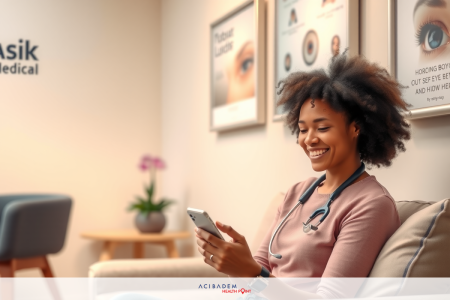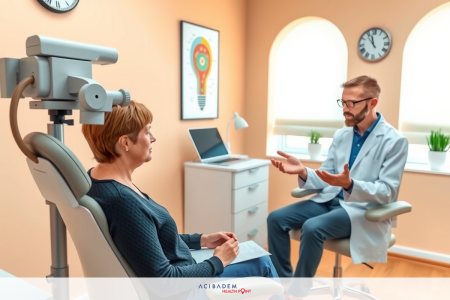Gonorrhea in Eyes Symptoms – Spot Early Signs
Gonorrhea in Eyes Symptoms – Spot Early Signs It’s key to spot gonorrhea in eyes symptoms early for quick help. Learn the early signs to catch gonorrhea eye infection sooner. This guide shares important facts. It helps you know the main eye gonorrhea signs for fast medical care. Knowing about these symptoms protects your vision and keeps you healthy.
Understanding Gonorrhea and Its Impact on Eyes
Gonorrhea is a common sexually transmitted infection. It is caused by the bacterium *Neisseria gonorrhoeae*. Knowing about gonorrhea and its effects, including on the eyes, is very important.
What is Gonorrhea?
Gonorrhea affects the reproductive tract’s mucous membranes primarily. But, it can also infect the throat, rectum, and eyes. Men and women face severe health issues if they don’t treat gonorrhea. It could cause pelvic inflammatory disease and epididymitis.
How Gonorrhea Affects the Eyes
When gonorrhea hits the eyes, it is called ocular gonorrhea. Symptoms include redness, swelling, and an itchy, oozy eye. These signs could mean big trouble. It could cause corneal ulcers and even make you blind if not treated.
| Aspect | Details |
|---|---|
| Common Symptoms | Redness, swelling, irritation, mucopurulent discharge |
| Potential Complications | Corneal ulcers, blindness |
| Treatment | Antibiotics, early medical intervention |
Doctors say it’s critical to spot ocular gonorrhea symptoms early. Quick action with the right antibiotics can save your eyesight. Knowing the signs and getting treated fast can stop gonorrhea from hurting your eyes.
Common Symptoms of Eye Gonorrhea
It’s important to know the signs of gonorrhea in the eyes early on. This helps with quick treatment. We look at how the symptoms change from start to end. This information can help you know when to see a doctor.
Initial Symptoms to Look Out For
At first, eye gonorrhea might feel like usual eye troubles. You might feel some mild discomfort. Signs in the beginning include:
- Redness and irritation in the eyes
- Increased tearing or discharge, often mistaken for conjunctivitis
- Slight sensitivity to light
Although these early signs may seem minor, don’t ignore them. Finding it early can stop it from getting worse.
Advanced Symptoms You Shouldn’t Ignore
Not treating eye gonorrhea can lead to serious problems. Later signs can be much worse. They might include:
- Severe pain and swelling of the eyelids
- Thick, pus-like discharge from the eyes
- Significant vision impairment or even vision loss
If you get these advanced signs, it’s a serious infection. You need to see a doctor quickly. A doctor can help avoid serious eye problems.
How to Identify Gonorrhea in Eyes Symptoms
It’s important to spot the signs of gonorrhea in the eyes early. This helps with quick and right treatment. This can stop bigger problems and keep your eyes healthy in the long run. Let’s look at the main things to watch for.
Visual Indicators
First, let’s talk about what you might see. Initial signs often get people to go see a doctor. Some key eye infection signs include:
- Redness and Irritation: If your eyes stay red, it could mean an infection is there.
- Pus-like Discharge: Thick, yellowish goo coming out is common with this eye infection.
- Swollen Eyelids: If your eyes look puffy, there might be a problem.
- Increased Tearing: You might cry more if your eyes are irritated or infected.
Physical Discomforts
Next, let’s talk about how it might feel. And these feelings can also be signs of an eye infection. Being aware of these symptoms helps with early action and treatment:
- Burning Sensation: If your eyes burn a lot, it’s a sign that should not be ignored.
- Sensitivity to Light: Bright lights becoming painful on your eyes can be a big issue.
- Eye Pain: Pain getting worse means the infection could be bad.
- Blurred Vision: Not seeing clearly or vision changes can alarm you to a problem.
Spotting gonorrhea in eyes early with these signs means you can get help quickly. If you see any of these signs, go talk to an eye doctor or your general doctor fast. They will make sure you get the right treatment soon.
Risk Factors Associated with Eye Gonorrhea
It’s key to know the risk factors linked to eye gonorrhea. Some groups are more likely to get it. Knowing this helps target efforts to stop it.
High-Risk Groups
Some people have a bigger chance of eye gonorrhea. This includes those who have unsafe sex with many partners. Also, people with a past of STIs are at risk. This goes for healthcare staff who handle infected fluids too, if they’re not careful.
| High-Risk Groups | Reason for Higher Risk |
|---|---|
| Sexually Active Adults with Multiple Partners | Increased likelihood of STI transmission |
| Individuals with Previous STIs | Higher susceptibility to infections |
| Healthcare Workers | Exposure to infected bodily fluids |
| Infants Born to Infected Mothers | Risk of infection during childbirth |
Preventative Measures
Preventing eye gonorrhea is in your hands. Using condoms and staying faithful helps a lot. So does getting checked for STIs often and treated if needed.
For healthcare workers, safety steps are key. They should wear eye protection and gloves. This cuts their risk.
Safety starts with us. Health programs and sharing condoms can lower eye gonorrhea risks. These steps are good for everyone’s health.
Medical Diagnosis: Recognizing Gonorrhea Eye Infection Signs
It’s key to catch eye gonorrhea early for good treatment. Doctors check the eyes closely to see if there’s gonorrhea. They look for signs and may do some tests.
First, an eye doctor will look for redness, swelling, and discharge. These are big hints something’s wrong. You might also tell the doctor if your eyes hurt or if you’re light sensitive. These clues help a lot.
To make sure about the diagnosis, you’ll need tests. They take samples of your eye gunk to check in a lab. This checks for the gonorrhea germ, making sure of the diagnosis.
Here’s a simple list of how they find out:
| Diagnostic Method | Description | Purpose |
|---|---|---|
| Visual Assessment | Examining the eyes for redness, swelling, and discharge. | Identifies physical signs of infection. |
| Patient Symptoms | Reporting pain and light sensitivity. | Provides clues on if there’s an infection. |
| Lab Tests | Collection and analysis of eye discharge samples. | Confirms the germ that causes gonorrhea is there. |
Finding out if you have eye gonorrhea needs a good checkup. Mixing doctor’s look with lab work is best. Knowing early makes treating it work better, keeping issues away.
Effective Treatment Options for Ocular Gonorrhea Symptoms
It’s key to treat ocular gonorrhea fast to avoid major problems. This part talks about the best ways to deal with it. You’ll read about what doctors usually recommend and some tips for taking care at home.
Medical Interventions
For treating eye gonorrhea, doctors use antibiotics. They might give you pills or medicine through your veins. The CDC says using more than one antibiotic type is best. This helps kill all the bacteria and stops them from becoming immune to the medicine.
You might need special eye drops too. These fight the infection right in your eyes. Remember, taking your meds as told is very important.
Home Care Tips
Doing certain things at home can help ease the symptoms and speed up your healing. Here are some important tips:
- Maintaining Hygiene: Always wash your hands before touching your eyes. This stops the infection from spreading.
- Using Clean Towels: Change your towels and pillowcases a lot to keep them germ-free.
- Avoiding Contact Lenses: You should wear glasses instead of contacts. Contacts might make your eyes worse.
- Applying Warm Compresses: Put a warm, clean cloth over your closed eyes. It helps with the pain and swelling.
To get better, follow these home care tips and take your prescribed medicines. This mix can work very well and make you feel better.
Prevention Strategies to Avoid Eye Gonorrhea
To stop ocular gonorrhea, do many things. Use safe sex and clean habits each day. These steps help keep your eyes safe from this infection:
- Safe Sexual Practices: Use condoms and dental dams always. This lessens your risk of getting gonorrhea. Having fewer sexual partners and getting STI checks helps too.
- Personal Hygiene: Don’t touch your eyes with dirty hands. Clean your hands well. Wash your face and eyes every day with a clean towel.
- Public Awareness Campaigns: Join in and support campaigns about STIs. They teach people and lower eye gonorrhea cases. Programs in schools and centers also help.
Doctors say, get tested often for STIs, even if you feel fine. This helps avoid eye gonorrhea. If you think you have gonorrhea, see a doctor fast. This stops eye problems from happening.
Potential Complications of Untreated Gonorrhea in the Eyes
Leaving gonorrhea in the eyes untreated is bad news. It can cause big problems. Fast medical help is a must. This section looks at what can happen to your eyes and health if not treated.
Long-term Impact on Vision
Not treating gonorrhea in the eyes can hurt your vision a lot. You might feel like there’s something in your eye all the time. Also, bad pink eye and corneal ulcers are possible. In the worst cases, you might not see well or at all. Doctors say, if you catch it early and treat it, you have a better chance of keeping your sight. So, getting help right away is really, really important.
Other Health Risks
Gonorrhea in your eyes can be not just bad for your vision. It can also spread to other parts of your body. This can cause very serious sickness. You might end up needing hard treatment. Plus, not treating an eye infection can make it easier to give the sickness to someone else. So, taking care of your eye problem is not just for you. It’s to keep everyone else safe too.
FAQ
What are the early symptoms of gonorrhea in the eyes?
Early signs of eye gonorrhea may show as red eyes, a lot of tears, and pain. You might also feel very sensitive to light. It is very important to see a doctor quickly.
How does gonorrhea affect the eyes?
Eye gonorrhea happens when your eyes touch the bacteria. This can make your eyes red, swollen, and painful. If not treated, it can really harm your eyes.
What are the signs of gonorrhea in the eyes?
If you have eye gonorrhea, you may see a lot of goo coming from your eyes. Your eyes will be red, swollen, and feel itchy. Without treatment, it can get worse.
What initial symptoms should I look out for in eye gonorrhea?
Watch for signs like red eyes or a lot of tears. Your eye might also have a lot of goo. Seeing a doctor soon is very important.
What are advanced symptoms of eye gonorrhea that shouldn't be ignored?
Serious signs include very painful eyes, sudden sight loss, and eyelid swelling. Getting help right away is crucial to avoid lasting eye damage.
How can I identify gonorrhea in eyes through visual indicators?
Look for redness, too many tears, or a thick, yellow goo. If your eyes show these signs, see a doctor fast.
What physical discomforts are associated with gonorrhea eye infections?
Your eyes may hurt, be very sensitive to light, and feel gritty. These are signs you need to see a doctor right away.
Who are the high-risk groups for eye gonorrhea?
People who have a lot of sex and don't use protection are at high risk. This includes people with more than one partner. Babies born to infected mothers are also at risk.
What are some preventative measures for eye gonorrhea?
To lower your risk, have safe sex and get tested often. Avoid touching people's body fluids. Babies should get eye treatment if their mom has gonorrhea.
How do healthcare providers diagnose gonorrhea in the eyes?
Doctors check your eyes and ask about your health. They might also take a sample from your eye to test. Getting the right diagnosis is key to getting better.
What are the treatment options for ocular gonorrhea?
Doctors will give you antibiotics to take or put in your eyes. Starting treatment early is very important. At home, keep your eyes clean and away from things that irritate them.
What strategies can prevent ocular gonorrhea?
To avoid eye gonorrhea, practice safe sex and keep clean. For babies at risk, doctors say they should get eye medicine at birth.
What are the potential long-term impacts on vision from untreated eye gonorrhea?
Without treatment, eye gonorrhea can cause big problems. Your cornea could scar or you might lose your vision. Early treatment can prevent this.
What other health risks are associated with untreated gonorrhea in the eyes?
If not treated, gonorrhea in the eyes can go to other parts of your body. This can lead to joint pain, sores on the skin, and making you very sick.













